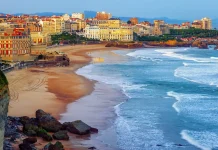This article was translated by John R. Bopp
The World Tourism Organization (UNWTO) and the Basque Culinary Center (BCC) in San Sebastian have just presented the “Guidelines for the Development of Gastronomy Tourism“.
These guidelines were drawn up by BCC Professors Amaia López de Heredia and Iñaki Gaztelumendi, with the idea of being a roadmap to help countries and regions that want to develop culinary tourism, contributing a series of ideas to improve management in that area.
Its main message is that cuisine is a part of a place’s cultural heritage, and as such, it must be protected and cared for when advertising a tourist destination because, otherwise, it may succumb to that process that homogenizes local cuisine to the point that it can’t be distinguished from one place to another.
Tourism is a great force for social and economic change in the 21st century. Near or far, hundreds of millions of people want to get to discover new places and cultures. One of those elements that is ever more important, even key, is enjoying the local cuisine.
In this regard, tourism and the defense of local identity must go hand-in-hand to ensure that when visitors arrive, local restaurants and producers help to preserve and strengthen local cuisine.
There are some “success stories” about how to do this, and also some “failure stories”. All these lessons need to be learned and studied so as to create tools that allow visitors to arrive and enjoy a place without erasing what makes that place special.
La República – 23/6/2019 – Ecuador
El potencial de la gastronomía como patrimonio cultural
La cocina forma parte del patrimonio cultural de un lugar y como tal debe ser protegida y cuidada a la hora de promocionar un destino turístico porque, de lo contrario, puede sucumbir a la banalización que homogeneiza la oferta gastronómica hasta el punto de no distinguir una ciudad de otra.
(Follow) (Automatic translation)
UNWTO -5/2019 – ONU
Guidelines for the Development of Gastronomy Tourism
The Guidelines for the Development of Gastronomy Tourism have been developed by UNWTO and the Basque Culinary Center (BCC), a UNWTO affiliate member, as part of its long-term collaboration. The guidelines aim to serve as a practical toolkit to support the development of gastronomy tourism in destinations by providing recommendations on key aspects such as planning and management by national tourism administrations (NTAs), national tourism organizations (NTOs) and destination management organizations (DMOs).
(Follow)
Download the guidelines here
Related publication, “Gastronomy Tourism – The Case of Japan”, here
Last Updated on Dec 20, 2020 by About Basque Country





